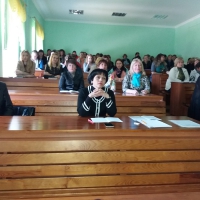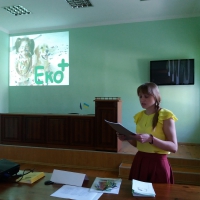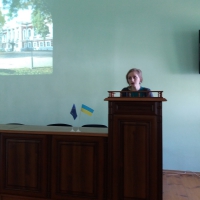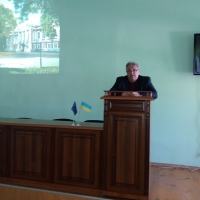Innovative Technologies of Future Teachers’ Ecological Сompetence Formation: the European Experience
|
May 15, 2017 in Oleksandr Dovzhenko Hlukhiv National Pedagogical University at the faculty of preschool education within the framework of the grant program Erasmus+, direction of Jean Monnet, held a regional scientific-methodical seminar «Innovative Technologies of Future Teachers’ Ecological Сompetence Formation: the European Experience». The seminar was attended by the employees of the preschool institutions from Hlukhiv, Sumy and Chernihiv regions, Methodist of Hlukhiv Department of Education, teachers from Pereiaslav-Khmelnytskyi State Pedagogical University named after Hryhorii Skovoroda, Pavlo Tychyna Uman State Pedagogical University, undergraduate students and all indifferent to the problem of ecological safety and future preschool teachers’ ecological-pedagogical culture formation. |
The theme of the seminar is relevant because Ukrainian and European preschool institutions need in a new generation of educators who possess an ecological-pedagogical culture.
The Ukrainian preschool education system can be enriched by the experience of the European Union in the field of the future teachers’ ecological-pedagogical culture formation in the training phase.
The aim of the workshop was to exchange information about some aspects of future teachers training in the EU countries and Ukraine.
In the course of the seminar the participants discussed topical issues in the following areas:
- Environmental safety and education in the context of innovation and sustainable development: the European experience.
- Innovative technologies of future teachers’ ecological competence forming in European countries.
- Innovative technologies using in the process of teachers’ further training in the field of environmental education and security in the EU.
Especially interested were the next reports: «Students and Сurrent Teachers’ Environmental Education in the EU» (Liudmyla Zahorodnia); «Future Preschool Specialists Preparing to Ecological Education of Children in the European Countries» (Iryna Danyl’chenko); «Waste Isolation Through the Eyes of Children. European Experience for Ukraine» (Olena Melnyk); «The socio-historical background of the formation of education for sustainable development: synergy of European and national processes» (Inna Korenieva); «The education of children for sustainable life skills in the educational process of preschool educational establishment "Zhuravka"» (Hlukhiv) (Bozhko Svitlana).
Environmental training for preschool teachers "Eco+", held Samilyk Valentyna.
Active participation in the discussing of this problem took Rudyshyn Serhii Dmytrovych – the doctor of pedagogical Sciences, Professor, Head of theory and methodology of teaching natural-science disciplines Department, Ponomarenko Tetiana Oleksandrivna – the doctor of pedagogical Sciences, Professor, Head of preschool pedagogy and psychology Department, Methodist of Hlukhiv Department of Education – Samoshchenko Vitaliia Olehivna, preschool teachers from Hlukhiv and Hlukhiv region.
Professor Rudyshyn Serhii Dmytrovych noted the importance of environmental education as an aspect of sustainable development. Ponomarenko Tetiana Oleksandrivna said, we, Ukrainians, should appreciate those natural resources that have and to preserve their integrity for future generations and for this it is necessary to prepare the preschool teachers, who lay the foundations of ecological culture in the preschoolers. Between the preschool teachers was an interesting discussion about "useful and harmful objects of nature."
The seminar participants noted the relevance of the problem, and the necessary of the changes in the professional training of preschool teachers, in particular, the introduction in the curricula of students 012 «Preschool education» of the special ecological disciplines, which form ecological-pedagogical culture of the preschool teachers.
Special attention should be paid to the practical and scientific aspects of future preschool teachers’ ecological competence formation. But these changes are possible in the case of relevant standards' development in the industry of higher education. Invaluable in this process may be the experience of the European Union.




